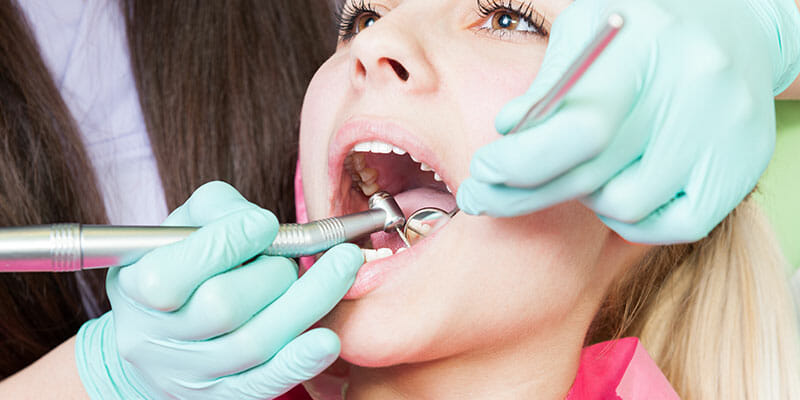“Are plaque and tartar the same?” Patients often ask their dentists this question. Truth is, both are quite different, but the presence of either one signifies the deterioration of oral health. Let’s explore the differences between the two and what you must do to prevent these oral conditions.
What is Plaque & What is Tartar?
Our teeth are naturally protected by enamel, the hardest substance in our body. When you take good care of your teeth, your enamel can last a lifetime. However, dental issues like plaque and tartar can damage this tough exterior and destroy your teeth and gums. Did you know that plaque builds up first, and when it hardens, it develops into tartar?
Plaque
Plaque is a soft, sticky film that coats your gums and teeth when you eat something. Plaque does not occur all of a sudden. In fact, plaque buildup happens throughout the day, every day. According to the ADA (American Dental Association), plaque contains more than 500 species of bacteria that act on the leftover food particles in your mouth. These harmful bacteria produce acids that act on your enamel and damage your teeth. Your teeth are more prone to plaque when you eat or drink sugary foods.
Tartar
When plaque accumulates, it hardens into tartar or calculus. Unlike plaque which can be easily removed by brushing daily, tartar is tougher because it has a rough and hard exterior. Also, tartar accumulates around the teeth and below the gum line. Its yellow or brownish colour makes it easy to identify. The problem with tartar is that it can only be removed by your dentist. Unlike plaque, brushing and flossing will not help removal of tartar.
The formation of plaque or tartar is not good for your oral health. Let’s go through some key differences between the two oral conditions.
Plaque Vs.Tartar: 3 Key Distinctions
1. Formation:
Plaque buildup happens throughout the day from the moment you start eating your breakfast or having that cup of coffee. The buildup is more when you eat starchy and sugary foods.
Tartar buildup occurs due to the prolonged accumulation of plaque on the teeth. Tartar is hard and difficult to remove with normal brushing or flossing.
2. Appearance:
Plaque is a slimy, almost colourless or mild yellowish sticky coating on the teeth.
Tartar is hard and crusty and discolours teeth if it’s not removed quickly.
3. Removal:
Plaque is easy to remove. Using a good fluoride toothpaste to brush your teeth and regular flossing will help eliminate plaque.
Contrariwise, tartar deposits are hard to remove and attempting to do so by scratching or pulling it out will only harm the teeth. Only dentists can remove tartar with the help of dental tools and procedures like scaling or root planing.
Whether easily removable or not, plaque and tartar can impact oral health and increase the risk of Gingivitis and Periodontitis. As always, “Prevention is better than cure.” The following are some simple ways to prevent plaque and tartar buildup.
Also Read: Understanding Prosthodontics For Your Oral Health
Plaque & Tartar Prevention: 6 Ways to Protect Your Teeth
1. Brush your teeth twice daily for at least two minutes. Using fluoride toothpaste will help rebuild the worn-out enamel.
2. Floss daily to remove the hidden food particles from between the crevices of your teeth.
3. Use an electric toothbrush to clean your teeth. They are far more effective than manual brushes.
4. Limit sugar and starch intake and opt for more protein and calcium-rich foods. Take more fruits and vegetables instead of sweets and carbohydrates. Remember to brush as floss after consuming foods that contribute to plaque buildup.
5. Visit your dentist for a checkup at least once in six months. A dental visit will allow your dentist to look for cavities or remove any signs of plaque with professional cleaning procedures.
6. Quit unhealthy habits like smoking and chewing tobacco. Smoking increases the risk of plaque and tartar buildup, periodontal diseases and oral cancer.
Why Should You Have Plaque & Tartar Removed?
Plaque is easy to deal with. Tartar is the bigger concern because these stubborn, calcified deposits are hard to get rid of and can lead to bigger problems like Periodontitis.
That said, you should not forget that untreated plaque causes tartar. Plaque can also damage your teeth with cavities and give you bad breath. Tartar can cause the gums to recede from the gum line, thereby exposing the tooth root. Gum receding requires immediate treatment to prevent further damage and tooth loss.
Untreated tartar results in Periodontitis, a severe form of gum disease, which is characterised by:
- Swollen and bleeding gums.
- Foul breath.
- Extremely sensitive teeth.
Visit Your Dentist & Save Your Teeth From Plaque And Tartar
Brushing and flossing regularly can help curb plaque. However, if you have hard and stubborn deposits on your teeth, you must visit your dentist immediately. Book an appointment with your dentist at 4 Squares Dentistry, the finest dental hospital in Medavakkam. Get your teeth checked for tartar deposits and have them removed before they inflict further damage. Call us to book your appointment today!
